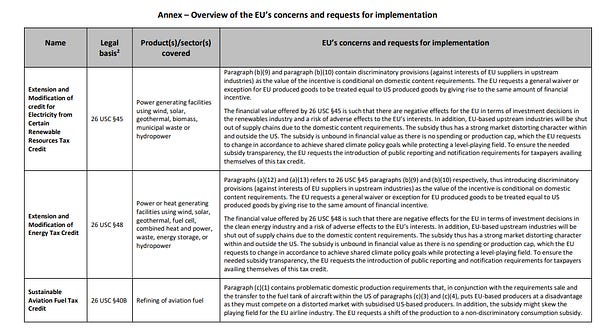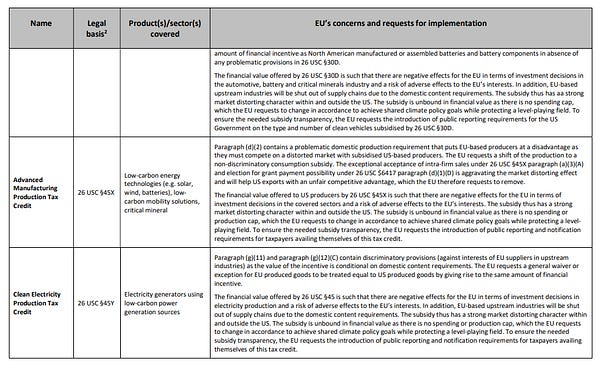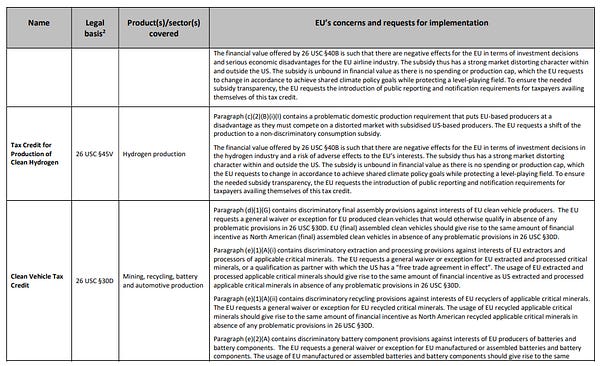Most Favoured Nation: Is The EU a Climate Villain?
More on the Inflation Reduction Act, Mercosur, and why a little bit of fraud is probably a good thing.
Welcome to the 78th edition of Most Favoured Nation. This week’s edition is free for all to read. If you would like to receive top quality trade content in your inbox every week, please do consider becoming a paid subscriber.
What’s the optimal amount of fraud? The book I am currently reading — Lying for Money by Dan Davies — makes the case that, assuming you want to live in a high trust society (which you should because it’s better), then it’s not zero. In fact, a bit of fraud is a price well worth paying to not live in a world where very single transaction outside of your immediate family (or even maybe within it too) requires an enormous amount of due diligence, assurances, etc.
All of this is kinda true for a border regime as well. If you want to ensure that everything single thing entering and leaving the country meets all of the appropriate rules, has paid the correct taxes, is not actually guns, etc. then you’ve probably got to have government officials check every single consignment. But that would mean, in practice, pretty much no international trade, b’cos no one’s got the time or money to be putting up with that nonsense
Which is why the question for governments deciding on a border policy is not “how can we remove fraud entirely?” It’s “how much fraud are we willing to put up with for the sake of a commercially efficient border?”
Anyhow, if you want more thoughts on border management, do check out the paper I helped write for the Institute of Export and International Trade on the future of the UK border. [Ed: the paper does not advocate fraud.]
Climate hero/zero
As everyone knows the EU is pissed with the US because Biden’s new Inflation Reduction Act discriminates against EU producers. We’ve discussed this previously in MFN, but the basic issue is that the IRA introduces a tax credit for electric vehicles that is ultimately conditional on the battery being sourced in North America:
As of 2024, at least 40 percent of the critical minerals in EV batteries being sourced from the US or a country which the US has a free trade agreement with. This limit will rise to 80 percent in 2026.
As of 2024, the EV battery having at least 50 percent North American content. This limit will rise to 100 percent in 2028.
As of 2024, no EV battery having critical minerals sourced from a “foreign entity of concern”. [Ed: love a good euphemism for “China”.]
This is all quite obviously in breach of the US’s WTO obligations.
But did you know that the EU isn’t just pissed at the US because of the potential impact on batteries and EVs? It’s also pissed about a load of other things too
In its formal comments to the US Treasury/IRS, the EU lists a whole number of other things it is annoyed about.
These include the domestic content requirements in the IRA’s …
Extension and Modification of credit for Electricity from Certain Renewable Resources Tax Credit;
Extension and Modification of Energy Tax Credit;
Clean Electricity Production Tax Credit;
Clean Electricity Investment Tax Credit; and
Clean Fuel Production Tax Credit.
For example:
It is also concerned about discriminatory subsidies in the IRA’s …
Sustainable Aviation Fuel Tax Credit;
Tax Credit for Production of Clean Hydrogen;
Advanced Manufacturing Production Tax Credit; and
Clean Fuel Production Tax Credit.
For example:
In the absence of the US introducing waivers or tweaking how the subsidies are applied [note: not the easiest thing to do without involving Congress … but not impossible], all of this could lead to a massive trade dispute.
This has led to claims that the EU is threatening to use arcane trade rules to hamstring the US’s fight against climate change.





So does the EU not care about climate change?
Here it’s a matter of perspective. From the EU’s perspective, the IRA is quite blatantly using climate as an excuse to pursue good old fashioned protectionism and throw money at the domestic electorate. If the US really cared about climate it wouldn’t be making it more expensive to buy [potentially superior] EU Green tech.
And the EU is right.
But what if we’re not talking about a world in which the options are either a discriminatory IRA that obviously isn’t primarily about climate vs a non-discriminatory IRA that is primarily about climate.
What if, in the real world, the option at the time, due to the nature of US politics, was a discriminatory IRA that isn’t primarily about climate vs no IRA at all.
Is the world’s climate better off for having a flawed IRA versus no IRA at all? I dunno [I’m not a climate scientist].
And what if, without the IRA, the Democrats would have done worse in the midterm elections. If the flawed IRA helped the Democrats win elections, is that positive or negative for the climate? [see Todd Tucker’s massive thread of Democrats who support local content provisions winning.]
So …
Let the people/readers of Most Favoured Nation decide!
[Brazilian] Beef Is Back on the Menu
I’ve long been of the view that the EU probably needed someone like Bolsonaro [neoliberal, supporter of free trade, hater of rainforests] as president of Brazil to get the Mercosur trade deal agreed. But it would then probably need someone more like Lula [socialist, sceptical of free trade, lover of rainforests] as president of Brazil to get the deal ratified by the European Parliament and grumpy member-states.
So here we are. Lula is President, so game on? Maybe. The choreography is still pretty tricky. The EU will need the deal to be reopened to incorporate new, enforceable, environmental commitments. But once its opened, Brazil will, understandably, want to get some new things too, most probably greater market access for its food exports and perhaps stripping back some EU market access. Which the EU doesn’t want. Which means maybe the deal shouldn’t be reopened after all. Which means the EU Parliament won’t sign it off. Which means we’re back to stage one.
Let’s see.
As ever, do let me know if you have any questions or comments.
Best,
Sam





